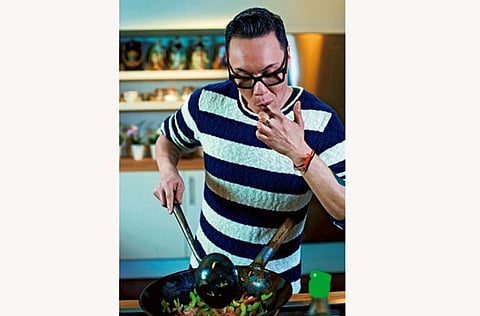Fashion guru Gok Wan is a bonafide foodie
New Channel 4 TV show ‘Gok Cooks Chinese’ shows he’s stylish in the kitchen too

When Gok Wan – a well-known fashion consultant with successful television shows like Gok Wan’s Fashion Roadshow and Gok’s Fashion Fix under his belt – talks about food, one wonders about his credentials. But if you were to dig into his background, you would realise that the man really does know what he is talking about. He has food in his DNA. He is the son of John Tung Shing Wan, a restaurateur and chef who runs a successful business in Whetstone, Leicestershire. Gok has learnt a lot about the food business from the time that he has spent at the restaurant.
“I used to work for my dad in the kitchen, he says. “And it’s one thing serving food for friends, but another serving it to people who are paying for it, because you have a huge amount of responsibility that comes with it. I think that’s where my confidence comes from.”
A few months ago Gok’s new TV show on Channel 4 Gok Cooks Chinese, went on air and has the viewers eating out of his hand. The 37-year-old however says that he’d “die of embarrassment” if he were ever called a TV chef (“Not because it’s a bad thing. Just because I’m not really. I’m a cook and I do my job on the telly.” )
With the show, and accompanying cookbook of the same name, Gok is keen to debunk some of the myths about Chinese cuisine, and encourage people to try making it at home.
“The biggest myth is that it’s really unhealthy and complicated and you have to use very exotic ingredients you can only get from Asia. All of that is wrong.
“Traditional Chinese food is super-healthy and it isn’t that complex. Once you’ve got the principles right and the preparation done, the actual cooking is the easiest part. “It’s a slightly different discipline from cooking Western food. Most of the ingredients, bar a handful in the entire book, you can get from a supermarket.”
His dishes, he insists, are more akin to the “mountain food” you’d find in homes, rather than the gloopy fare some of us associate with Chinese restaurants. “I would never want to take anybody out of business,” he says carefully. “A lot of people love that kind of food. But this is a different style. It’s like opening the doors to an Asian family and saying, ‘This is what we cook at home’.”
Indeed, viewers are given a glimpse of Wan’s family life in the series, with his father cropping up now and again to share tips and gamely chuckle at his son’s teasing. “I love cooking with him,” Wan says. “We drive each other nuts. I’m almost 40 now, so I’m the adult in the relationship and he’s kind of regressed. It always happens with families. But when we get to the kitchen he remains the master. He’s obviously got many more years’ cooking experience than I do. He’s the one who taught me so he’ll always be the person in control.”
While growing up surrounded by food, Wan battled both obesity and later anorexia, a struggle that he has openly discussed. But he says his attitude towards food never changed. “I never really considered that when I made the series, anyone would make a direct comparison between anorexia or obesity and cooking, because eating disorders are very rarely about the food. You don’t hate food to not eat it and you don’t often eat too much food because you’re addicted to it. It’s far more psychological.
“I never missed food when I stopped eating it. I just left it for a little while.”
Sign up for the Daily Briefing
Get the latest news and updates straight to your inbox




